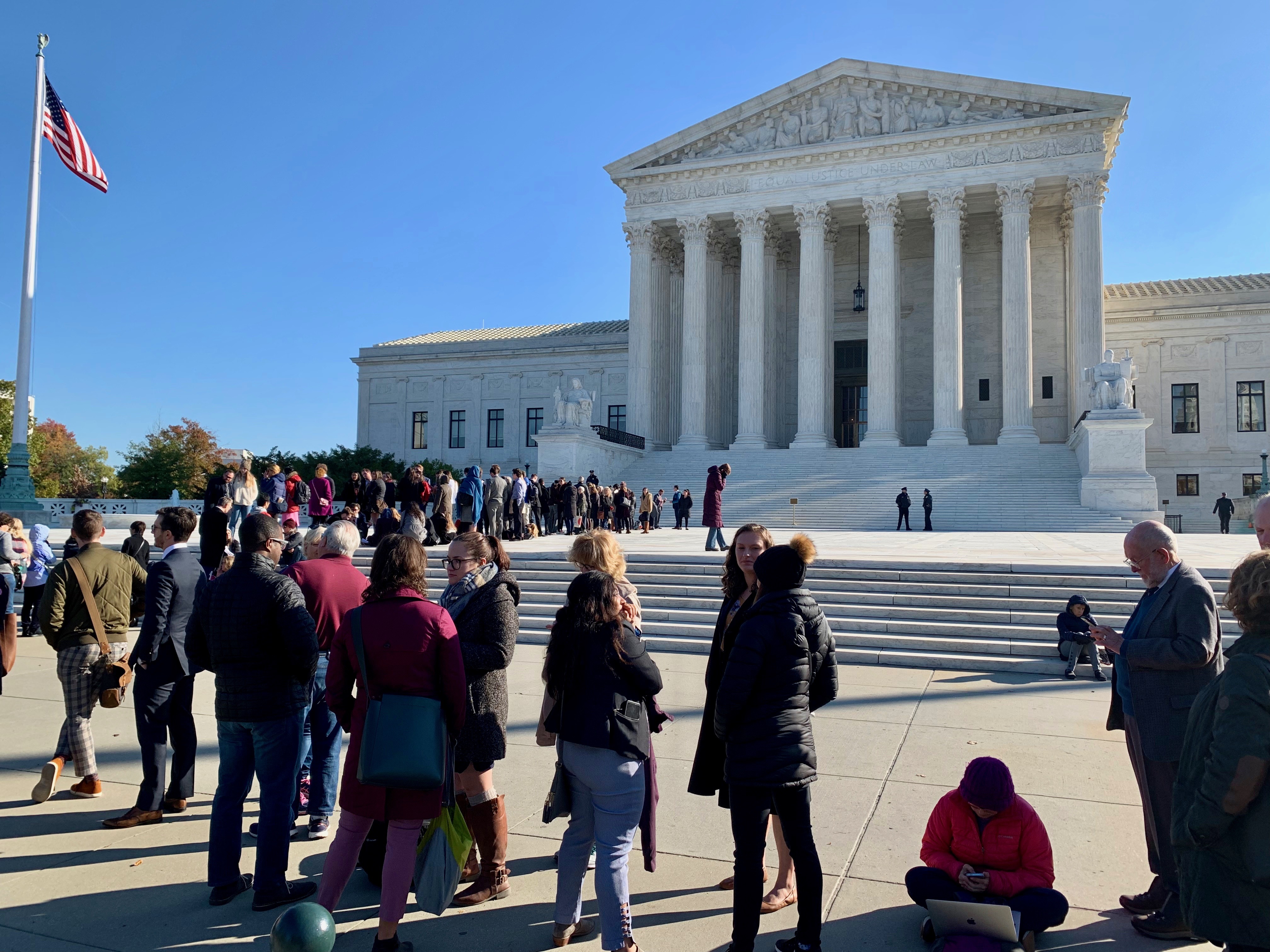US Supreme Court Hears Maui Pollution Case As Mayor, Council Fight Continues
The high profile case is now in the hands of the justices, but if the Maui County Council gets its way a decision may never come.
WASHINGTON 鈥� When all was said and done Wednesday, Maui County Mayor Michael Victorino left through a side door.
Victorino travelled to Washington this week to listen in on oral arguments in a U.S. Supreme Court case that could have far-reaching implications for the future of the Clean Water Act, a decades-old federal law that aims to keep pollutants out of the nation鈥檚 rivers, lakes and oceans.
After the hearing, Victorino immediately exited the building and reporters had for him about his role in the case, and, in particular, his fight with his own County Council that wanted to settle before it reached the high court.

Victorino said only that he 鈥渇elt comfortable鈥� with how the justices responded to the county鈥檚 arguments and that he was hoping for more 鈥渃larity in the law.鈥�
He also said he doesn鈥檛 buy any of the hype that a favorable ruling for Maui County would make it easier for individuals, governments and businesses to discharge pollutants into open waters.
鈥淚 don鈥檛 believe that,鈥� he said as he continued to walk away.
At issue in the case is a wastewater treatment facility in Lahaina that discharges millions of gallons of treated effluent deep into the ground using injection wells. That sewage then mixes with groundwater and seeps into the ocean where it harms coral reefs and other marine life in the area.
Environmental groups, represented by the nonprofit law firm Earthjustice, sued the county in 2012 saying that the discharge of such pollution without a permit violated the Clean Water Act.
Maui County disagreed and has argued, despite lower court rulings to the contrary, that the federal law only applies to discharges directly into the water, not when waste is pumped into the ground first.
The county has found allies in the fight with the Trump administration and a number of special interest groups representing the oil and gas, agriculture and mining industries, among others.
On Wednesday, the justices appeared to be looking toward a compromise in the case.
On the one hand, they expressed skepticism of Maui County and the Trump administration鈥檚 arguments that no permit was needed so long as a pollutant was discharged underground first before seeping into a federally protected waterway.
Justices Stephen Breyer and Elena Kagan both said that interpretation would provide a “road map” for anyone wishing to skirt pollution regulations.
Chief Justice John Roberts sounded just as dubious questioning Malcolm Stewart, the U.S. Justice Department deputy solicitor general, who argued the case on behalf of the Trump administration.
A number of justices, particularly Breyer and several on the conservative side of the bench, including Samuel Alito and Brett Kavanaugh, worried about what a ruling in favor of the environmental groups might mean for individuals using septic tanks.
For instance, would they then also have to get discharge permits or face hefty fines if pollution leaking from their systems was traced back to their homes?
鈥淪ome clear line for the property owner, I think, is really important here,鈥� Kavanaugh said.
A ruling from the court is due by the end of June, but by then the case could be moot.
The Maui County Council approved a settlement agreement 5-4 in September in an attempt to avert the high court showdown and the possibility of an unfavorable ruling that weakens the Clean Water Act.
Victorino and his top county attorney, Moana Lutey, have refused to accept the settlement, however, sparking a separate legal battle in Hawaii state court over who has the authority to settle a lawsuit 鈥� the mayor or the County Council. Should a judge rule that the settlement prevails, the high court likely would not render a final decision.

Earthjustice attorney David Henkin, who argued before the Supreme Court on behalf of the environmental groups, said there鈥檚 not much more he can do.
The case is already in the hands of the nine justices, who he said all seemed to ask the right questions during Wednesday鈥檚 arguments. As for Maui County and the settlement agreement all he can do is wait.
鈥淚鈥檝e long given up on figuring out what the county of Maui is going to do,鈥� Henkin said. 鈥淚 thought this case had settled innumerable times, so I鈥檓 not going to guess what鈥檚 going on there and what鈥檚 going to happen.鈥�
Should the case settle and a decision disappear into the ether, Henkin shrugged and said at least he鈥檇 have the goosefeather pen every lawyer gets when arguing a case before the nation鈥檚 highest court.
鈥淚 still get to keep my white quill,鈥� he said with a smile.
 Sign up for our FREE morning newsletter and face each day more informed.
Sign up for our FREE morning newsletter and face each day more informed.
We need your help.
Unfortunately, being named a聽finalist for a聽Pulitzer prize聽doesn’t make us immune to financial pressures. The fact is,聽our revenue hasn鈥檛 kept pace with our need to grow,听.
Civil Beat is a nonprofit, reader-supported newsroom based in 贬补飞补颈驶颈. We鈥檙e looking to build a more resilient, diverse and deeply impactful media landscape, and聽we hope you鈥檒l help by .
About the Author
-
 Nick Grube is a reporter for Civil Beat. You can reach him by email at nick@civilbeat.org or follow him on Twitter at . You can also reach him by phone at 808-377-0246.
Nick Grube is a reporter for Civil Beat. You can reach him by email at nick@civilbeat.org or follow him on Twitter at . You can also reach him by phone at 808-377-0246.

